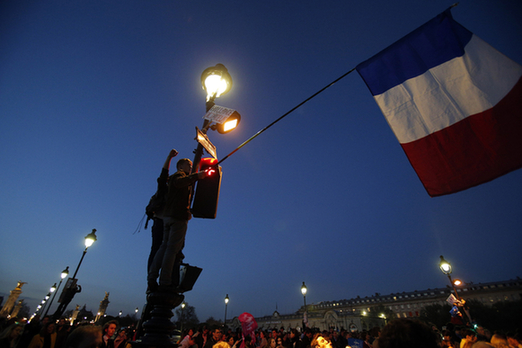歐洲 法國經(jīng)濟
Austerity stakes
緊縮困境
A reluctant government faces the imperative of public-spending cuts
法國削減公共支出勢在必行,政府陷入兩難境界
Franse’s finance minister, Pierre Moscovici, staged a charm offensive in London this week to improve his country’s battered economic image. Days after the European Commission had forecast that France would miss its budget-deficit target of 3% of GDP in 2013, a key promise of President Francois Hollande’s, Mr Moscovici urged people to look beyond “simplistic stereotypes”. The government may miss its target, he said, but it was making structural reforms to restore competitiveness and sound public finances.
法國的財務首相皮耶爾 莫斯科維奇本周在倫敦打了漂亮的一仗,改善了法國經(jīng)濟窘迫不堪的形象。歐盟委員會預測法國將難以兌現(xiàn)2013年GDP3%的預算赤字目標,而那是總統(tǒng)弗朗西斯奧朗德的重點承諾。數(shù)日之后,莫斯科維奇呼吁人們看穿“單純的陳見”。他表示,也許政府不能如期完成目標,但它采取結構化改革以恢復競爭力,重塑夯實的公共財政。

The commission’s verdict was sobering. French GDP will grow by 0.1% this year, compared with a government forecast of 0.8%, and the deficit will reach 3.7%. After long defending the 3% target as a sign of its credibility, and insisting on overly ambitious growth forecasts, the government has abruptly switched message to plead for more time. And the commission clearly intends to opt for indulgence.
委員會的裁定是一盆冷水。新的一年,法國GDP增長率將會是0.1%,與政府0.8%的預測相差甚遠。而且赤字會達到3.7%.長期堅守3%的目標已成為法國信譽的象征,同時伴隨著野心勃勃的增長預測。但風云突變,政府扭轉口徑,央求著要更多時間。顯然,委員會意欲縱容之。
Without much struggle, it seems, France has won the argument that it should not be punished for its failure. It blames poor growth—the commission forecasts a euro-zone recession in 2013—and fears that more belt-tightening might make things worse. The French claim that, judged by the structural deficit, adjusted for the cycle, the government has made a bigger effort than at first appears. Mr Moscovici does not plan an emergency budget to squeeze the deficit back towards 3% this year, partly for fear of provoking “a political and social shock”. Jens Weidmann, the Bundesbank chief, said that “putting consolidation off would just shift the problem into the future.” But the German government stayed silent and Wolfgang Schauble, the finance minister, told a newspaper he was “fully confident” thatFrance was on the right track.
雖未曾付出太多的努力,但看上去,法國已經(jīng)贏得不必為失敗而受懲的輿論支持。它責難低下的增長率——委員會預測了2013年歐元區(qū)的蕭條——并擔心緊縮政策會讓一切更糟糕。法國宣稱,由相對經(jīng)濟周期校準的結構性赤字判斷,政府作的努力比表面上的要更為顯著。莫斯科維奇并未制定緊急計劃以在年內(nèi)將赤字壓縮到3%,部分是由于擔心這會引起“政治和社會的震蕩。”德國央行主觀簡魏德曼表示延遲“延遲”只是把問題留給未來。但德國政府保持沉默,而且財政首相沃爾夫岡邵伯向報紙表示他“無比自信”地認為法國經(jīng)濟正步入正軌。
Mr Moscovici may get away with drift once, but he is unlikely to be indulged twice. As it is, letting him off the hook depends on taking seriously his efforts to sort out the public finances. This year, three-quarters of the effort to curb the deficit consists of higher taxes, says the Cour des Comptes, the national auditor. Yet with a total take of over 44% of GDP, Franceis already the most heavily taxed country in the euro. Companies and the rich have been squeezed; investment has gone on hold. The constitutional court has rejected Mr Hollande’s planned 75% top income-tax rate, although the government plans to revive it in another form. Even some Socialist deputies concede that the government cannot go on pushing up taxes.
但事不過三,莫斯科維奇很難繼續(xù)得到包容。事實上,只有正視他為解決公共財政問題作出的努力才能讓他免于責難。據(jù)國家審計員Cour des Comptes表示,今年控制赤字的努力有四分之三都用于征收高額稅。法國已是歐元區(qū)課稅最繁重的國家,稅收占到GDP的44%。公司和富人保守壓榨,投資擱置了。立憲法院拒絕了奧朗德設立最高75%所得稅的計劃,但政府計劃通過別種形勢實現(xiàn)它。甚至一些社會黨代表也承認政府不能無止盡地抬高稅收。
That leaves no choice but cuts in public spending. Mr Moscovici says these will account for “most” of the deficit reduction in the 2014 budget. This is where the hard part begins. The commission forecasts a deficit in 2014 of 3.9%, even higher than in 2013, as well as a rise in unemployment to 11%. The government has begun to float various ideas, such as means-testing family benefits and lengthening the period for pension contributions. A policy review is under way with the aim of eliminating duplication and cutting jobs. The prime minister, Jean-Marc Ayrault, has set up a commission to look into pension reform. “This is all very different to what Socialist governments did before,” says an insider.
如此一來,法國別無選擇,唯有削減公共支出。莫斯科維奇表示那會占到2014年預算赤字削減的“大部分”。艱險的征程由此展開。委員會預測2014年的赤字率會達到3.9%,甚至高于2013年的,與此同時失業(yè)率會上升至11%。政府集思廣益,采用諸如家庭支付能力調(diào)查以及延長養(yǎng)老金的供期。首相吉恩馬克 艾洛特已成立一個委員會調(diào)查養(yǎng)老金改革。“這與此前社會黨政府的所作所為大相徑庭。”內(nèi)部人士透露說。
The difficulty is political. It may be evident to outsiders—and to some in the government—that, given its competitiveness and growth problems, France has no choice but to rethink its generous welfare state and well-staffed public sector. But a year after the 2012 election campaign, public debate has barely begun. Mr Hollande was elected on a promise to kick-start growth, cut unemployment and end austerity. Now he presides over recession, rising joblessness—and the need to impose more austerity on dumbfounded voters.
難度在于政治方面。考慮到法國的競爭力和經(jīng)濟增長困境,它除了對優(yōu)厚的福利和齊整的公共部門加以慎思外別無選擇。但2012年選舉結束的一年之后,公眾的質疑聲才剛剛開始泛濫。奧朗德帶著促進經(jīng)濟增長,降低失業(yè)率和終結緊縮的承諾上任。如今,他要為經(jīng)濟蕭條和上漲的失業(yè)率買單——以及讓投票者目瞪口呆的緊縮政策。翻譯:袁航












